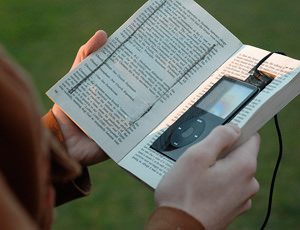Are We Too Wired to Read?
With multiple gadgets and screens constantly running, and perhaps even a different sense of time than our forebears had, it's no surprise that powering down long enough to curl up with a book is becoming an endangered activity -- although, as David L. Ulin argues in the Los Angeles Times, it's still a very vital contemplative practice to pursue.
With multiple gadgets and screens constantly running, and perhaps even a different sense of time than our forebears had, it’s no surprise that powering down long enough to curl up with a book is becoming an endangered activity — although, as David L. Ulin argues in the Los Angeles Times, it’s still a very vital contemplative practice to pursue.
Your support matters…Los Angeles Times:
Yet there is time, if we want it. Contemplation is not only possible but necessary, especially in light of all the overload. In her recent essay collection “The Winter Sun” (Graywolf: 196 pp., $15 paper), Fanny Howe quotes Simone Weil: “One must believe in the reality of time. Otherwise one is just dreaming.” That’s the point precisely, for without time we lose a sense of narrative, that most essential connection to who we are. We live in time; we understand ourselves in relation to it, but in our culture, time collapses into an ever-present now. How do we pause when we must know everything instantly? How do we ruminate when we are constantly expected to respond? How do we immerse in something (an idea, an emotion, a decision) when we are no longer willing to give ourselves the space to reflect?
This is where real reading comes in — because it demands that space, because by drawing us back from the present, it restores time to us in a fundamental way. There is the present-tense experience of reading, but also the chronology of the narrative, as well as of the characters and author, all of whom bear their own relationships to time. There is the fixity of the text, which doesn’t change whether written yesterday or a thousand years ago. St. Augustine composed his “Confessions” in AD 397, but when he details his spiritual upheaval, his attempts to find meaning in the face of transient existence, the immediacy of his longing obliterates the temporal divide. “I cannot seem to feel alive unless I am alert,” Charles Bowden writes in his recent book, “Some of the Dead Are Still Breathing” (Houghton Mifflin Harcourt: 244 pp., $24), “and I cannot feel alert unless I push past the point where I have control.” That is what reading has to offer: a way to eclipse the boundaries, which is a form of giving up control.
Independent journalism is under threat and overshadowed by heavily funded mainstream media.
You can help level the playing field. Become a member.
Your tax-deductible contribution keeps us digging beneath the headlines to give you thought-provoking, investigative reporting and analysis that unearths what's really happening- without compromise.
Give today to support our courageous, independent journalists.

You need to be a supporter to comment.
There are currently no responses to this article.
Be the first to respond.